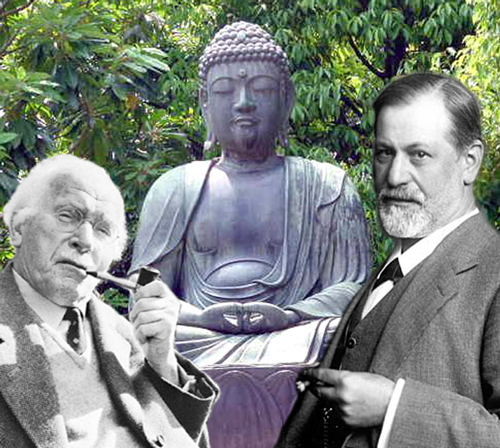So last month The New York Times published a controversial article on Zen by Chip Brown about a long-time practitioner of Zen meditation who came to the conclusion that his meditation practice was insufficient for working with his depression, and therefore he sought out therapy. Denise Abatemarco initiated a great discussion about the article here on the One City Blog.

I have some thoughts on how therapy can augment one’s meditation practice and study of Buddhist psychology (FYI, The Interdependence Project is hosting what is sure to be a wonderful Buddhism and Psychology series this summer, which you can listen along to wherever you are). Everyone gets depressed, whether clinically or just more occasionally, and to say that meditation practice is not suited to work with depression is pretty off, in my humble opinion. If our meditation practice is making you feel more and more alienated from your self, and causing you to supress anything at all in the name of peace of mind, then I think we need to reassess our understanding of what meditation is and how it is helpful.
First of all, I don’t agree with Chip Brown’s underlying assertion that Zen or any other form of meditation practice is about ignoring your life issues, or suppressing our “stuff” into viewing all the mind’s contents as “empty” or insubstantial. In fact, if you look at a core Buddhist technique like the four foundations of mindfulness, the third and fourth of these guided meditations are all about looking directly at what is going on in your life and arising in your thoughts. The great Buddhist teacher Pema Chodron speaks at length about never suppressing what we are feeling. Buddhism is all about understanding our negative habits and transforming them, never, ever ignoring them. What is ignored cannot be seen for what it is, and what cannot be seen cannot be dealt with. Psychological suppression is in fact the #1 problem in Buddhist philosophy, not any sort of proposed cure to our problems.
So fundamentally I think there’s a perversion of meditation going on when we say it’s not about looking at the day by day events and experiences of life, and that therapy is. A good critique of Chip Brown’s article was published on the Shambhala Sun Blog.
But there’s another more practical issue, in my personal experience. And that is this: we talk a lot in Buddhist meditation about the importance of finding a teacher or teachers to work with, to be a “mirror” to your mind, to check in about life on a very regular basis and act as a therapeutic anchor (if not a formal therapist) in one’s life. The term “Kalyanamitta” or “Kalyanamitra” is the main Buddhist word for teacher . Yet most students of Buddhism find that regular in-person access to a living Buddhist teacher is a very hard resource to find. (We had a great lecture at the I.D. Project just a few weeks ago on precisely this topic).
On the other hand, most of us in therapy get access to our therapist once a week. Our therapist comes to know our personal stuff quite well. Our meditation teacher? Usually not so much.
So on a practical level, therapists serve in the role of eye-to-eye teacher in a way that Buddhism has not yet figured out – for the most part – to provide for students in Western life. I have a lot of theories about this – primarily that teaching Buddhism is still considered a spiritual rather than psychological or scientific vocation, and this perception makes it a lot harder to construct a livelihood model around it, because people are wary of charging living-wage fees for things they consider “spiritual.” Meanwhile, there is a path and structure for a therapist to make a living. So therapists abound, and most Buddhist teachers who want to make their living working with people do so by becoming therapists.
Beyond a more “diagnostic” mode of training specific clinical ailments, this seems to me to be a key difference between studying Buddhism and going into therapy. A Buddhist teacher that you can see often is hard to find, sadly sometimes impossible. A therapist is not so hard to find. For myself, as a teacher and student of Buddhism, finding a Buddhist therapist is one of the best things that happened to me this year.

